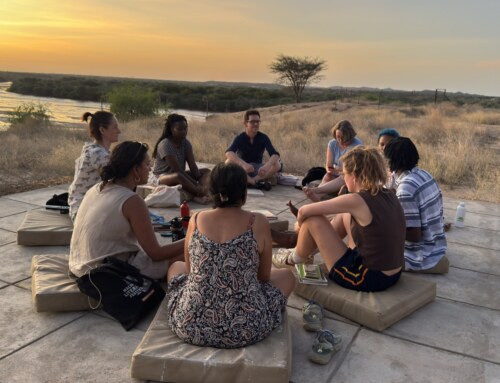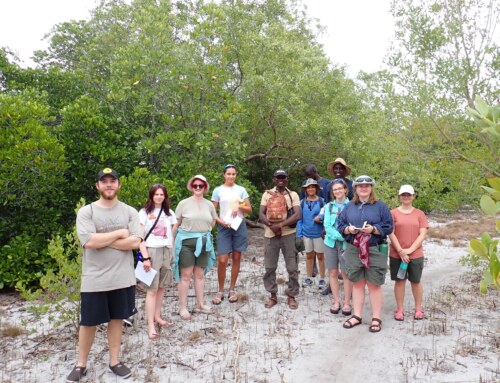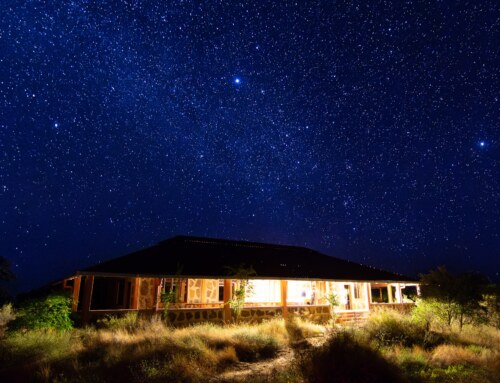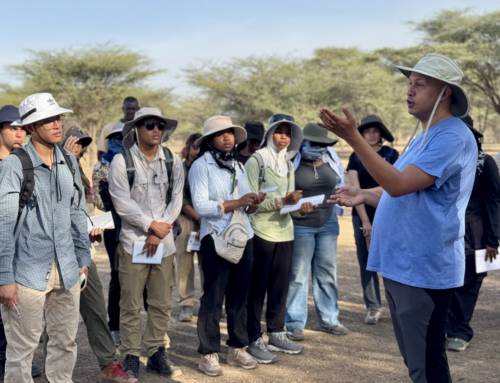For the final two weeks of the fieldschool, the students returned across to the West side of Lake Turkana to the TBI Turkwel campus. Although it was hard to say goodbye to the wonderful staff, wildlife and landscapes of Ileret, we were also excited to get back to Turkwel, especially to see the camp dog, Tupak, again.
The students hit the ground running for the final module, which was led by Prof. Lisa Hildebrand (“Dr H”) and focused on the Prehistoric Archaeology of Africa. With fellow archaeologist and Resident Fieldschool Director Dr Nicholas Taylor, Dr H and the students headed off on a two-night camping trip to visit of some of the most important Stone Age archaeological sites known – not just of the Turkana Basin – but from anywhere in the world. We visited sites including Lomekwi 3, Kokiselei 4 and 6, and Nadung’a 13, provide evidence of the development and evolution of early human technologies. At the Lomekwi 3 site, Dr Taylor spoke to the students about the discovery made there by the West Turkana Archaeological Project, of the world’s oldest stone tools that are dated to 3.3 million years ago. We then continued north to set up camp at Nariokotome and after a good night’s rest, spent most of the next day touring the Nadung’a Site Complex, where Dr Taylor has recently been conducting archaeological excavation of 750-thousand-year-old Acheulean stone tools.
Under the expert and watchful eyes of Dr H and Dr Taylor, the students had the chance that afternoon to collect stone raw materials and knap them to make their own stone tools, just as hominins did for millions of years before.

Maddie and Alisa showing off their new, sharp, stone flakes. All the pieces were collected and taken back to TBI for proper disposal.
That evening at sundown, the students visited the nearby monument at the findspot of one of the world’s best known hominin fossils, the 1.5-million-year-old Nariokotome (or Turkana) Boy. On the long drive back to TBI Turkwel, the students did some survey for artefacts at the site of 1.7-million-year-old site of Kokiselei 2. They were also fortunate to get a unique tour of some much more recent archaeological remains at the Kalokol Pillar Site from Dr H, who is one of the world’s experts in this time period. This monumental site dates to the last few thousand years, and was evidently a very important place for the some of the earliest pastoralist communities that inhabited the Turkana Basin, since they not only systematically transported heavy basalt pillars to the site, but also, buried their dead there.

A moment to remember: the fieldschool visits the monument marking the discovery spot of the ‘Turkana Boy’ Homo ergaster fossil, accompanied by expert fossil and stone tool hunter Sammy Lokorodi (blue t-shirt), and TBI Field Assistant John Lonyala.

Students learning about Stone Age lithics at the site of Kokiselei 2.
The next few days were spent gearing up for some days of excavation at the Holocene site of Nakwaperit, which is located nearby to the Turkwel campus. This meant that the students could still look forward to chilled water, sodas, and cool showers at the end of each day digging at the site. Dr H and her Later Prehistory of West Turkana (LPWT) colleagues have been doing archaeological investigations at Nakwaperit since 2021, and so the first job was for the team to remove the sterile sediment that had been backfilled into the excavation trenches at the end of the 2023 field mission. While this was being done, the students had informative training in how to record the precise locations of any remains uncovered in the trenches using a Total Station. They also learned the principles of how to record the progress of the dig, and evaluate precisely the types of sediments encountered. The students also laid out a grid and started excavating a new trench at Nakwaperit.

Dr H and TBI Field Assistant Polyne Loyo help Mitchelle get to grips with setting up the Total Station. Archaeologists use these machines to mark the precise locations of all the specimens they find and generate a 3D map.
In the final week of the archaeology module and of the fieldschool, the students continued excavations at Nakwaperit, and also visited more later prehistoric sites at Lothagam, including a site occupied by fisher-hunter-gatherers, plus the Lothagam North and Lothagam West pillar sites, that are similar in overall character to the one at Kalokol.
In the final few days, the students had the chance to revise for their final exams, say many goodbyes to the TBI Turkwel staff and to Tupak the campus dog. On the final Friday afternoon, the students all graduated and received their all-important fieldschool certificates.

All finished! Happy students celebrate graduating the Spring 2024 Origins Fieldschool with TA Medina Lubisia and Dr Lisa Hildebrand.
Fittingly, this was held in the mess, where the students had spent a majority of their free time at Turkwel. In the evening, the kitchen prepared a goat roast, as well as a very special graduation cake for the students. On Saturday, the students, along with Dr Taylor and Medina, woke up early and headed back to Nairobi. Goodbyes were said, some tears were shed, and happy stories were shared…and with that we drew a close to the Spring 2024 Origins Fieldschool.
We look forward to hosting more students later in the year for the next TBI Fieldschool. Until then, Ejok Noi and thank you for following our fieldschool journey!





